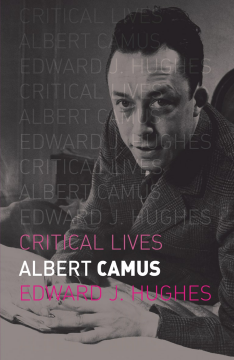
Additional Information
Book Details
Abstract
Winner of the Franco-British Society Literary Prize 2015
Few figures of twentieth-century French culture carry such an air of romance and intrigue as Albert Camus. Though his life was cut short by a fatal car accident in 1960, when he was just forty-six years old, he packed those years with an incredible amount of experience and accomplishment. This new entry in the Critical Lives series offers a fresh look at Camus’ life and work, from his best-selling novels like The Stranger to his complicated political engagement in a postwar world of intensifying ideological conflict. Edward Hughes offers a particularly nuanced exploration of Camus’ relationship to his native Algeria—a connection whose strength would be tested in the 1950s as France’s conflict with the anticolonial movement there became increasingly violent and untenable.
Ultimately, the picture Hughes offers is of a man whose commitment to ideas and truth reigned supreme, whether in his fiction, journalism, or political activity, a commitment that has led the man who disclaimed leadership—“I do not guide anyone,” he once pleaded—to nonetheless be seen as a powerful figure and ethical force.
“Though a latecomer to this literary and political tempest, Hughes’s short book is nevertheless a welcome arrival. . . . Hughes has written a concise and cogent account of Camus’s life and writings. Unlike many of his biographers, Hughes maintains an admirable critical distance from his subject. With his even language, his balanced summaries and mostly fair analyses, he avoids the appearance of parti pris. . . . The territory Hughes covers is well travelled, yet he brings to light telling details and offers readings missed by many other biographers. . . . Clearly written and well researched, Hughes’s book offers a solid introduction to Camus’s life and work.”
— Times Literary Supplement
“Drawing extensively on correspondence, interviews, notebooks, news articles, and biographies, Hughes traces Camus’s life in detail, from his working-class upbringing in colonial Algeria through his rise to celebrity and untimely death. . . . Those looking for a brief yet comprehensive biography will be pleased.”
— Choice
Edward J. Hughes is professor of French at Queen Mary, University of London, and the author of several books. He is the editor of The Cambridge Companion to Camus.
Table of Contents
| Section Title | Page | Action | Price |
|---|---|---|---|
| Cover | Cover | ||
| Albert Camus | 3 | ||
| Imprint Page | 4 | ||
| Contents | 5 | ||
| Note on Texts, Abbreviations and Translations | 7 | ||
| Introduction: ‘Who is Camus?’ | 9 | ||
| 1. Literacy, or ‘the Regular Rows of the Lines’ | 16 | ||
| 2. ‘True Love . . . Awkward Pages’ | 29 | ||
| 3. ‘This Algiers Happiness’ | 37 | ||
| 4. All Work and No Play | 47 | ||
| 5. A Beautiful Profession | 55 | ||
| 6. A Tale of Two Outsiders | 64 | ||
| 7. ‘All Man’s Misery . . .’ | 75 | ||
| 8. Combat and the Narrative of Liberation | 87 | ||
| 9. ‘A Catastrophe Slow to Happen’ | 99 | ||
| 10. Wars of Words Continued | 111 | ||
| 11. Beyond Polemic: ‘From Now On, Creation’ | 117 | ||
| 12. Staging Confession | 129 | ||
| 13. Stockholm and the Backdrop to Fame | 139 | ||
| 14. 1958 | 152 | ||
| 15. Cohabiting with Oneself | 164 | ||
| 16. A Contested Legacy | 177 | ||
| References | 191 | ||
| Select Bibliography | 207 | ||
| Acknowledgements | 213 | ||
| Photo Acknowledgements | 215 |
